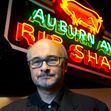Jim Auchmutey's Blog, page 4
November 4, 2015
Remembering Joseph
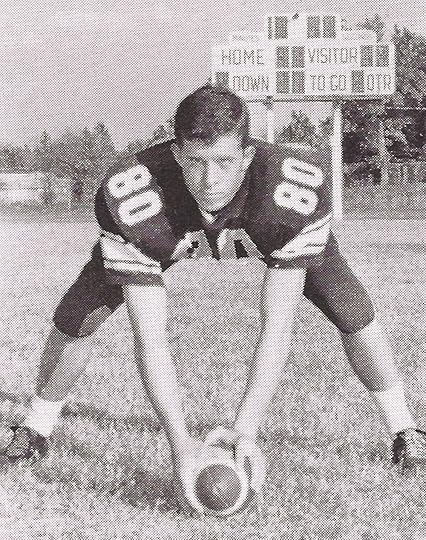
Several people I interviewed for “The Class of ’65” died before it came out. The passing that hit closest to home was that of Joseph Logan, one of Greg Wittkamper’s classmates, who plays a central role in the story and is pictured on the cover (middle of the second row). Last week marked a year since Joseph died, so I thought I should say something about him and the courage it took for him to speak with me so candidly.
Joseph was co-captain of the football team during his senior year at Americus High School and was dead set against Greg and Koinonia, the communal farm he came from, because they supported integration. Joseph never attacked Greg, but he was part of the crowd that ambushed him after school in the fall of 1964, and he cheered when one of his football teammates punched him in the face. Joseph never forgot the way Greg literally turned the other cheek and refused to fight back. Years later, teaching a Methodist Sunday school class, Joseph used the scene as a real-life example of the New Testament in action.
I first spoke with Joseph in 2006 when I did a story about the Class of ’65’s 40th reunion for The Atlanta Journal-Constitution. We reconnected as I started working on the book. Joseph had been teaching at Enterprise State Community College in Alabama for many years and was in declining health. We spoke over the phone several times and then met for breakfast and lunch whenever he came to Atlanta with his wife, Mary Alice, for treatment of his kidney disease and other ailments. I finally went to visit them in Enterprise, staying with them at their home. I liked them both very much.
Joseph’s intimations of mortality seemed to put him in a confessional mood. He told me things about his racial attitudes as a young person that I’m not sure he would have divulged a few years earlier. In particular, he told me about a night in the summer of 1965, during a civil rights demonstration in Americus, when he joined a pack of young men who attacked a black man on the street simply because he was black. Joseph didn’t assault the man, but he nearly did, clutching a chunk of concrete, and he regarded this brush with brutality as a turning point in his life. I’ve read that passage from the book numerous times during the talks I’ve given this year. (It starts on Page 144). Sometimes I tear up when I retell the story.
I suspect this incident was one of Joseph’s darkest memories. I’m grateful he was brave enough to relive it with me.
Joseph died late last October as I was going through the editing process. I know he was a little nervous about what I was going to write; truth is, I was a little nervous about what he would think of what I had written. I regret that he didn’t live to see the book published. I sent Mary Alice a copy and she wrote back saying that her husband would have been pleased. That meant a lot to me.
I should mention the three other people I know of that I interviewed for the book who have passed away: John Perdew, a civil rights activist in Americus who was jailed for months in 1963 for “inciting insurrection”; Vincent Harding, a clergyman and civil rights leader who counted Clarence Jordan and Martin Luther King Jr. among his friends; and Zev Aelony, another activist who was held for inciting insurrection and who lived at Koinonia off and on for several years. Zev was Jewish, but he fit right in with the community of Christians.
They were remarkable people -- Joseph and the rest of them -- and I was honored to tell part of their stories.
October 27, 2015
Still painful after all these years
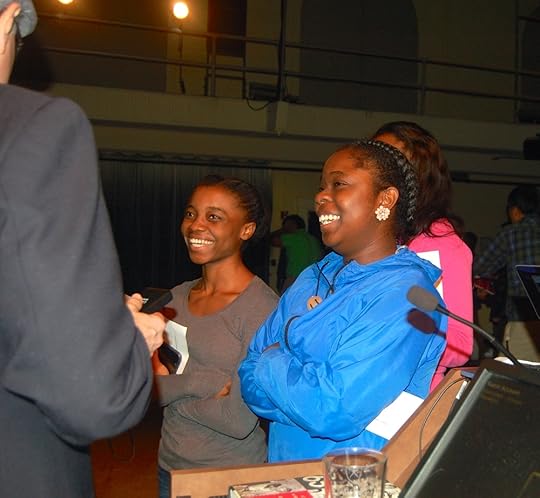
Greg Wittkamper and I did a talk at Oxford College of Emory University earlier this week –- the fourth time we’ve done a presentation together about “The Class of ’65” and perhaps the 30th time I’ve spoken about the book. You might think it has become routine. It hasn’t.
Before the talk, we had dinner with 14 students from professor Susan Ashmore’s class on the history of the civil rights movement. As we dug into some tasty salmon, the students peppered us with questions about the civil rights passage in south Georgia, Koinonia’s part in the movement, and Greg’s persecution at Americus High School. At one point, someone asked Greg how he had dealt with the trauma from those years. He started to respond but then fell silent, choked up and began to cry softly. I think he answered them eloquently without saying a word.
Greg apologized for losing his composure, but the students told him he didn't need to. I agree. Long after they’ve forgotten what I had to say about Koinonia and the civil rights struggle in Albany and Americus, they’ll remember that one man in his late 60s was still so moved by the events of more than half a century ago that he broke down in tears. You don’t forget that sort of thing.
After dinner, we gave our talk before a hundred or more students in Williams Hall and spoke with several of them at length afterwards (including, in this photo, Sandra Manhan and Keisha Michel). Thanks to Oxford chaplain Lyn Pace Jr. for inviting us, to Susan Ashmore for sharing our story with her class, and to religion professor David B. Gowler and American Studies professor Molly McGehee for being part of the evening. It was special for us – and unexpectedly moving.
October 22, 2015
Teachers

"Jim," a woman asked at one of my book talks, "do you remember me?"
Her face seemed familiar, but I couldn’t place the name.
“It’s Miss Neil,” she said, “from Knollwood.”
Of course! Miss Neil, my second-grade homeroom teacher at Knollwood Elementary School in Decatur, Ga. She had come to hear me speak about “The Class of ’65” at the Atlanta Athletic Club. I’ve done many book talks this fall – and I’ll be blogging about some of them – but this was one of the best ones, in large part because someone who helped teach me to read and write came to show her support for one of her students.
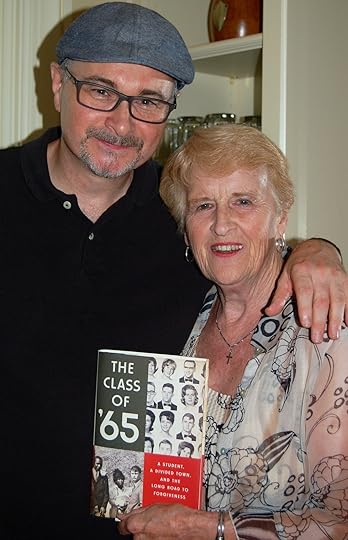
She’s Mary Virginia Shores now and retired from teaching. The color photo shows us together at the book club; the black-and-white one above is our class picture from 1962-’63. Miss Neil is at the back, while I’m on the front row, fourth kid from the right, trying hard to stand out with some silly pose.
Seeing Miss Neil made me think about all the things that were going on in the South during my second-grade year – things that I had no clue about. While we were sitting in her classroom, Ole Miss erupted in violence over integration, Martin Luther King Jr. was locked up in Alabama and wrote his eloquent “Letter from Birmingham Jail,” and Bull Connor’s police dogs were unleashed on demonstrators in that city in brutal scenes that shocked America.
Closer to home, the standoff over segregation in Albany was entering its second year and the protests were about to move up the road to Americus, where Koinonia was still being boycotted and its teenagers were still being harassed at Americus High School. Greg Wittkamper, the hero of my book, was about to begin his junior year – and things were going to get very hot for him.
We talked about all this at the Atlanta Athletic Club, where I spoke in a room facing the impossibly green golf course, just down the hall from the trophies and mementoes of the Bobby Jones Room. Most of the 30 or so people in my audience had read the book, and they posed thoughtful questions.

One woman raised her hand and simply wanted everyone to know how much she admired one character from the book: Gladys Crabb (at left), Greg’s senior English teacher, who was sympathetic to him and listened to him talk about his troubles during the worst of his persecution. When Greg’s classmates wanted to reconcile with him decades later, they knew just whom to contact: Mrs. Crabb, who put them in touch with him. She was still teaching her students 40 years after they had graduated. And because of teachers like Miss Neil, I was able to tell that story.
Thanks to the AAC Book Club and to Betty Marie Stewart, who invited me for what turned out to be a meaningful reunion of its own.
September 16, 2015
21st-century book club
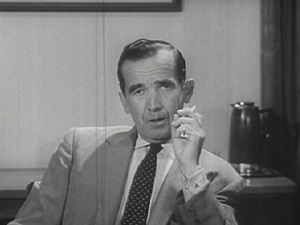
I had never done a book talk by Skype until the Literary Ladies book club of Columbia, S.C., asked me to join them and discuss “The Class of ’65” by remote hookup this week. I positioned my Macbook where the camera would show me against my bookshelves and waited for their call, which came right on time at 8:15. I clicked on the video button, and there they were: a living room full of book clubbers all facing me like I was there reaching for the cheese and crackers. In the corner of the screen I could see what they were seeing on their laptop, and it wasn't good. In an effort to illuminate my countenance with my desk lamp, I had made myself look like a scary flashlight face from a cheap horror movie. I apologized for the amateurish cinematography and started talking about the story behind the book.
It felt odd at first; I kept thinking of Edward R. Murrow interviewing celebrities like Humphrey Bogart and Lauren Bacall who were sitting in their Hollywood living rooms while he directed the banter from his New York studio. (CBS had better lighting, even in the 1950s.) But once I got over the novelty, it felt natural. I got to know a couple of the ladies, including Leila Dudley, a cousin of Deanie Dudley, one of the classmates in the Class of ’65 who reached out to Greg Wittkamper decades later and reconciled with him. Leila’s grandmother co-owned the building in Americus that housed the feed store that was bombed in 1957 for defying the boycott against Koinonia and doing business with the communal farm.
All in all, I highly recommend Skype book club meetings with authors and would be interested in doing others. There are only two problems: On Skype, the author can’t sign books or enjoy a glass of wine with the club. Our host for the evening, Becky Airheart, tells me that there was a bit of wine-drinking going on before they dialed me. I thought everyone looked happy! Thanks, Literary Ladies; hope you enjoyed the evening as much I did.
September 8, 2015
Homecoming

Speaking at the Decatur Book Festival was like a spin through the old neighborhood for me. I grew up in Decatur and as a boy used to visit the library next door to the venue where I talked about “The Class of ’65” over the Labor Day weekend: Decatur Presbyterian Church. What’s more, I was raised in a Presbyterian church and first heard about Koinonia and the religious and racial conflicts at the heart of my book during my first job, as an editor at the Presbyterian church’s denominational magazine.
All of which made it deeply gratifying when I looked out from the pulpit Saturday afternoon and saw that the stately old sanctuary was packed. “It looks like Easter out there,” one of the church staffers joked. I shared the pulpit with Jim Grimsley of Emory University, a decorated novelist who recently published his first nonfiction book, “How I Shed My Skin: Unlearning the Racist Lessons of a Southern Childhood.” It’s a touching memoir about how he overcame the prejudices of his upbringing in rural North Carolina. Ernie Suggs, my former colleague at The Atlanta Journal-Constitution, ably moderated.
The scene amused me at first; they had the Jims sitting in two of those throne chairs that I thought you had be an ordained minister to occupy. We shared a mic, like a couple of Beatles, and spoke for half an hour, and then took some good questions from the people in the pews. With that, we were whisked across the street to sign books in a tent run by FoxTale Book Shoppe, an indie in Woodstock, Ga., one of whose partners, Ellen Ward, happened to go to high school with me. Several of the people lined up to get their copies signed had known my parents or were friends of my sisters or brother. !t was like a class reunion.

A quick word about the Decatur Book Festival: It’s one of the best events of its type anywhere. For two days, they shut down several streets in central Decatur and turn the city over to thousands of strolling book lovers and vendors catering to them. Every sanctuary, hotel ballroom and government chamber for blocks around becomes a speaking platform for one of the hundred or so authors who come to promote their books and meet their readers. The crowds are big and engaged. This was the 10th annual edition, and I was honored to be involved -- especially because it’s my hometown.
September 4, 2015
Capturing a special moment
As I get ready to appear at the Decatur Book Festival over Labor Day weekend (3 p.m. Saturday, Sept. 5, at Decatur Presbyterian Church), I was thinking back to perhaps the best moment in the roll-out of "The Class of '65." Here's the video of me introducing my main character, Greg Wittkamper, at last month's Lewisburg Literary Festival in West Virginia, near where he lives. See him dabbing his eyes near the end? Those are tears. There were many reasons I wrote this book; telling this man's story of moral and physical courage was right at the top. If we don't sell another book, this made it all worthwhile. Thanks to Greg's brother-in-law, Gary Godwin, for capturing this moment. (P.S. -- We do want to sell more books! That's why I have a dozen more talks lined up in the coming weeks.)
August 21, 2015
What about Jimmy?
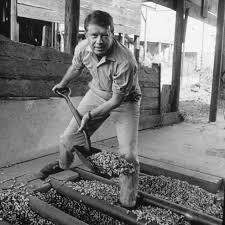
When I speak about “The Class of ’65,” people often ask about Jimmy Carter and whether he supported Koinonia when it was being terrorized and boycotted. The answer is complicated. Jimmy left the Navy and moved back to Sumter County with Rosalynn after his father died in 1953, a few months after my main character, Greg Wittkamper, settled at Koinonia with his family. The bombings and drive-by shootings targeting the communal farm started not long after that. The Carters were among the most progressive families in the county and resisted pressure to join segregationist groups like the White Citizens Council, which cost them some business at their peanut warehouse. Jimmy did not fall in with the local boycott against Koinonia -- in fact, he shelled some of their peanuts -- but did he do everything he could have to publicly support the embattled community? Well, he didn’t exactly mount a soap box and speak out for a group of people who were widely seen as communists and race-mixers. If he had, he probably never would have been elected dog catcher, much less state senator, governor and president of the United States. Launching a political career from the dying embers of the segregationist South was a delicate matter for a man who believed in the new order and came to embody it. Carter eventually embraced Koinonia and helped turn its most famous offspring, Habitat for Humanity, into one of the most beloved nonprofit organizations in the world. His White House chief of staff was Hamilton Jordan, nephew of Koinonia’s co-founder Clarence Jordan. So when I’m asked about the Carters and Koinonia, I say that they did what they could at the time ... and later did a great deal more. As the former president begins treatment for his melanoma, we can all endorse the sentiment of the latest campaign sign that's popping up in Plains, Americus and beyond: “Jimmy Carter for Cancer Survivor.” God bless and keep you, Mr. President.

August 11, 2015
How I got to Carnegie Hall

Not the one in New York, but the one in Lewisburg, West Virginia. I was invited to speak at the Lewisburg Literary Festival last weekend because Greg Wittkamper, the hero of “The Class of ’65,” lives nearby. More than 300 people came out to hear me in Carnegie Hall, one of a handful of performing arts centers built more than a century ago with Carnegie money. I have to admit that I was intimidated at first. It’s a theater, essentially, with a full stage and spotlights and a green room full of posters for artists who have played there: Wynton Marsalis, Harry Belafonte, Isaac Stern, Ralph Stanley, etc. After I had spoken for 20 or 25 minutes, I invited Greg on stage for a conversation, and he received a long standing ovation which moved him to tears and pleased me immensely. It was exactly the kind of book debut I had wanted for him in the place he has called home for more than 40 years. The rest of the festival was terrific. Kathryn Stockett was the main speaker and cracked everyone up with her stories about “The Help”; there’s something inherently funny about a woman who looks like a junior leaguer but sometimes has a potty mouth. There was also a Hunter S. Thompson lookalike contest; that’s Gary Godwin in the photo below, one of the contestants, with his wife Sallie, who happen to be Greg’s in-laws. “Why Hunter S. Thompson?” I asked one of the planners. “Hemingway was taken,” he answered. So let me explain that main photo above: Each author was asked to suggest a line from his or her book that captured its essence and could be reproduced in a banner on Lewisburg’s main street. I chose a line from Chapter 8, when Greg is confronted by a menacing group of boys after school who want to see him get his butt kicked. “My God,” he thinks, “am I going to get lynched? Are they going to stone me?” They tell me that they’ll rehang the banner every summer during the literary festival, so I guess I’m part of Lewisburg now -- like the street lamps and the stop signs. I like that.

August 3, 2015
Local hero
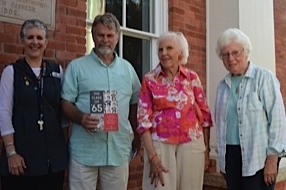
It’s good to see that Greg Wittkamper is finally getting some attention close to home. Greg, the main character in “The Class of ’65,” has spoken at two recent book gatherings near his nest in Sinks Grove, West Virginia. One was a party thrown on his behalf at Salt Sulphur Springs, a historic resort near the Virginia border, and the other was a book club in Lewisburg, a charming town near the famous Greenbrier Resort. (That’s Greg with some of the book club members.) There was a lively discussion about Greg’s plight as a persecuted teenager in Georgia, with one woman suggesting that he would have been better off if he had fought back against the classmates who were bullying him at Americus High for his religious and racial beliefs. Greg respectfully disagreed. As the author of the book, I’m with Greg on this one; it would have been a very different story if he had taken a swing at his tormentors -- less Gandhi than Rocky. The local attention will continue next weekend when Greg and I speak at the Lewisburg Literary Festival in an arts center called Carnegie Hall.
July 29, 2015
The forgotten Selma

Fifty years ago this week, Americus, Ga., made national news as racial unrest boiled over into violence and death. It was the final battle in the fight for the Voting Rights Act, a closing chapter in the struggle that had begun that spring in Selma, Ala. I devoted a chapter of my book, "The Class of '65," to the long hot summer that year in Americus. See that picture of a column of protesters? The white boy toward the left -- the only one in sight -- is my main character, Greg Wittkamper, who had just graduated from Americus High and was joining the marchers with his friend Collins McGee. The trouble started during a special election for justice of the peace when a candidate, a black woman, was told that she would have to stand in a separate voting line for colored people. For the next few weeks, there were daily demonstrations in Americus involving hundreds of protestors, roving bands of Klansmen, future governor Lester Maddox, future network anchorman Tom Brokaw, and civil rights leaders such as Hosea Williams, John Lewis and comedian Dick Gregory. It got ugly; one young man was killed in a drive-by shooting, and state troopers had to be summoned to keep the peace. How did it all end? You'll just have to read the book. (Thanks to Sam Mahone and the Americus-Sumter County Movement Remembered Committee, which found this photo in an old contact sheet.)

